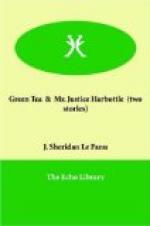One night during the session of 1746 this old Judge went down in his chair to wait in one of the rooms of the House of Lords for the result of a division in which he and his order were interested.
This over, he was about to return to his house close by, in his chair; but the night had become so soft and fine that he changed his mind, sent it home empty, and with two footmen, each with a flambeau, set out on foot in preference. Gout had made him rather a slow pedestrian. It took him some time to get through the two or three streets he had to pass before reaching his house.
In one of those narrow streets of tall houses, perfectly silent at that hour, he overtook, slowly as he was walking, a very singular-looking old gentleman.
He had a bottle-green coat on, with a cape to it, and large stone buttons, a broad-leafed low-crowned hat, from under which a big powdered wig escaped; he stooped very much, and supported his bending knees with the aid of a crutch-handled cane, and so shuffled and tottered along painfully.
“I ask your pardon, sir,” said this old man, in a very quavering voice, as the burly Judge came up with him, and he extended his hand feebly towards his arm.
Mr. Justice Harbottle saw that the man was by no means poorly dressed, and his manner that of a gentleman.
The Judge stopped short, and said, in his harsh peremptory tones, “Well, sir, how can I serve you?”
“Can you direct me to Judge Harbottle’s house? I have some intelligence of the very last importance to communicate to him.”
“Can you tell it before witnesses?” asked the Judge.
“By no means; it must reach his ear only,” quavered the old man earnestly.
“If that be so, sir, you have only to accompany me a few steps farther to reach my house, and obtain a private audience; for I am Judge Harbottle.”
With this invitation the infirm gentleman in the white wig complied very readily; and in another minute the stranger stood in what was then termed the front parlour of the Judge’s house, tete-a-tete with that shrewd and dangerous functionary.
He had to sit down, being very much exhausted, and unable for a little time to speak; and then he had a fit of coughing, and after that a fit of gasping; and thus two or three minutes passed, during which the Judge dropped his roquelaure on an arm-chair, and threw his cocked-hat over that.
The venerable pedestrian in the white wig quickly recovered his voice. With closed doors they remained together for some time.
There were guests waiting in the drawing-rooms, and the sound of men’s voices laughing, and then of a female voice singing to a harpsichord, were heard distinctly in the hall over the stairs; for old Judge Harbottle had arranged one of his dubious jollifications, such as might well make the hair of godly men’s heads stand upright for that night.
This old gentleman in the powdered white wig, that rested on his stooped shoulders, must have had something to say that interested the Judge very much; for he would not have parted on easy terms with the ten minutes and upwards which that conference filched from the sort of revelry in which he most delighted, and in which he was the roaring king, and in some sort the tyrant also, of his company.




